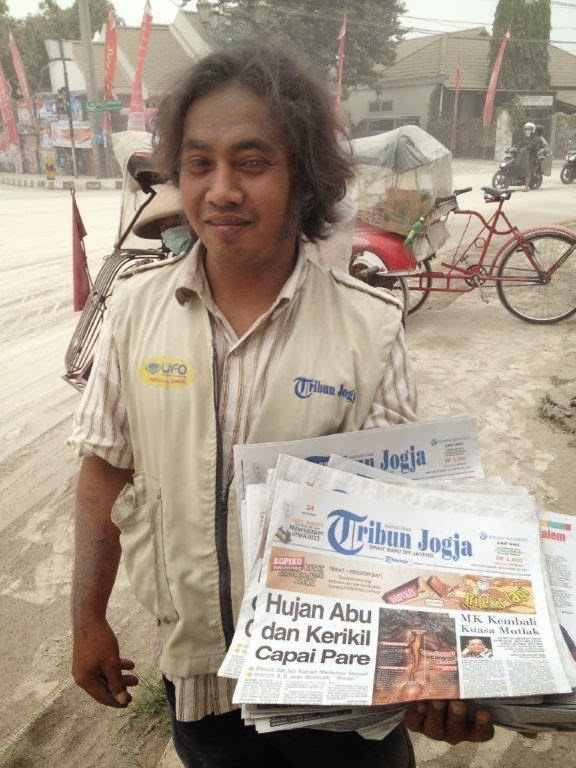A pale halo of light shines through the mosquito net. Somethings not right. Still half asleep I stumble to the doorway of our
outdoor bathroom – and rub my eyes. My brain tries to reconcile the scene.
The grass has changed from its normal fluorescent green to gunmetal
grey. Looking up, the frangipani
tree and everything within our bungalow’s courtyard is doused in a sickly grey coating.
A soundless mist is falling from the sky. I call out to Hal still snoring in bed, and fling open the veranda door to look out.
The colour has been sucked out of the
world. While we were sleeping everything has been blanketed in a layer of grime.
All is mute. The chatter of birds, the usual calls of the farmers as they wade out amongst
the rows of rice, even the hum of traffic is eerily missing.
We wander about trying to take it all in. Nuclear fallout momentarily flashes through my mind.
It's like a snow scene gone grey. A feeling of unease creeps over me.
Our first lucid thought is Merapi, the volcano less than 30
kilometres to the north.
Any confusion is short lived. The benefit of living with locals and a good internet connection.
Guning
Kidul some 209 kilometres away erupted at 22.50pm the night before. That loud boom we'd put down to an accident or distant thunder was the sound a volcano makes when pressure builds up and forces an explosion.
Tons and tons of
ash and sand had spewed out 17 kilometres into the air is now billowing in a 500 kilometre radius across Java, covering everything in its path.
As I wandered around the village a local woman on her way to work shelters me under her umbrella. Later we are handed face masks by someone in the street who will slip away before we have time to thank him.
A man in his sixties tells me this was only the second
time in his lifetime he had seen anything like this. The last time was in 2010
when Merapi erupted.
We are so used to humans running the show and being the cause of things that happen. To directly experience nature's power to wreak havoc leaves my mind a yawning blank.
Volcanology is not something I know much about after all. Living in the Pacific Ring of Fire I'm guessing I'm about to get a crash course.
To begin with I'm surprised to learn volcanic eruptions are not that rare. There are close to 500 volcanoes classified as active on the planet -- with 45 of
those right here on Java. Every year somewhere between 50 and 70 volcanoes will
erupt and the chance of that happening here is high. A sobering thought!
Known for large explosive displays, Kelud itself has erupted some 30 times since 1000 AD. In the 1919 eruption over 5000 people died, mainly through hot mudflows known as lahar.
Thankfully the volcano is monitored closely, with officials warning residents within 10 kilometres of Kelud to evacuate several hours before the actual eruption.
After breakfast we grab a car and go north. Driving around Jogja, the entire city is enveloped in a 3cm layer of ash. Surreal scenes greet us on every corner.
Apart from all the ash itself, the emptiness of the streets is the first thing that hits us. Being able to
walk around and witness the city without its usual throng of cars, scooters and becaks, and of course people. All the shops hoardings closed up, and everywhere coated in a white haze.
Occasionally we see someone out the front of a building
hosing down the cement or stooped over attempting to scoop up the
mountains of ash with a small broom. Otherwise the streets are weirdly deserted accept for curious spectators like us.
At least 200,000 people from the area surrounding Kelud have been directly affected, with 80,000 evacuated from their homes. Astonishingly only four people have perished due to the weight of ash caving in their roof.
The clean up job will be immense.
And the fine ash rain continues to fall with every gust of wind and as Kelud keeps on erupting. 'Welcome to Indonesia' someone quips as we shuffle the dust off everything only to have it re-covered again minutes later.
One good thing. The soil and young rice plants will benefit having been hit with a layer of fertiliser. Some plants will be lost but in a few months everything will undergo a spurt of growth my friends assure me.
You learn a lot about a culture when you see how they react under stress. Sunday a kind of street cleaning party took place in Tembi with local youth group leading the charge with water, brooms and hoses. Our offers to help are met with polite laughs.
For Jogja the ultimate outcome of all this ash is a massive house cleaning task. Floors to be mopped repeatedly, gutters to be cleaned, porches to be wetted down.
The quiet, calm resilience of the locals as they pump water from the stream and set about cleaning their streets, the cooperation between the army, police and local disaster recovery volunteers all tells me this is a place where adversity is met with collective sense of equanimity.
Valentines Day 2014: we end up having a cosy dinner for seven in a bustling local eatery run by an unflappable Frenchman. We're all exhausted and still reeling from the strangeness of this day. I can't imagine I'll ever experience anything quite like it again.











No comments:
Post a Comment